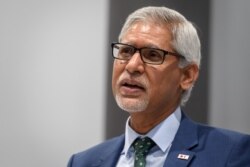The head of one of the world’s largest aid groups says he expects the coronavirus health crisis will have a major effect on migration for years to come.
Jagan Chapagain leads the International Federation of Red Cross and Red Crescent Societies. He told the French news agency AFP “people will feel compelled to move” when borders open because of lost jobs and food insecurity.
There are more than 15.5 million coronavirus infections worldwide, reports Johns Hopkins University in the United States. It adds that more than 633,000 of those infected have died.
The United States continues to lead the world with more than 4 million cases of COVID-19, the disease caused by the virus. Johns Hopkins reports that Brazil is second, with more than 2 million cases, followed by India with more than 1 million.
The increase in new infections forced many U.S. businesses to close or cut back. There was also a sharp increase in the number of U.S. workers who asked the government for financial aid. The Department of Labor reported that about 1.4 million workers have been hurt by business closures and asked for unemployment assistance.
In a report, the United Nations Development Program proposed that the world’s poorest people be given money to help stop the spread of the coronavirus.
The report suggested spending $199 billion every month on such a program. The money would go to 2.7 billion people living below or just above the poverty line in 132 developing countries. It would enable them “to buy food and pay for health and education expenses,” the report said.
I’m Susan Shand.
VOA News reported this story. Susan Shand adapted it for Learning English. George Grow was the editor.
_______________________________________________________________
Words in This Story
migration – n. the act of moving from one place or country to another
compel – v. have little choice, something one must do
poverty line – n. the point of income at which one is officially poor






